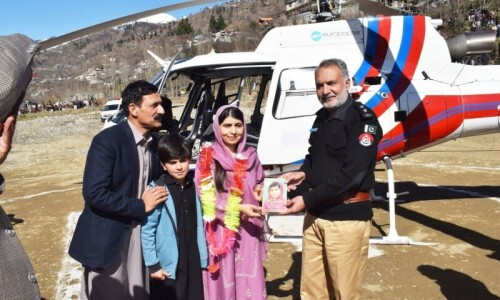THE frosty ties between Pakistan and India are a matter of concern for the international community, primarily because of the fact that two nuclear-armed neighbours locking horns spells an imminent threat to world peace. However, while this country has made several peace overtures to its eastern neighbour, these have nearly all gone unanswered. Therefore, perhaps the international community needs to do much more to facilitate a positive dialogue between Islamabad and New Delhi that can help defuse tensions, and usher in an era of amity in South Asia. In the current testy times, these proposals may be far-fetched, but it is in the face of such challenges that true statesmen rise above the din and make efforts for peace. On Wednesday, speaking at the World Economic Forum in Davos, Prime Minister Imran Khan discussed the need for the UN and the US to play a greater role in preventing tensions in South Asia. Moreover, while appearing on a local TV show, the ambassadors of Germany and France, speaking on the occasion of the anniversary of 1963’s Élysée Treaty, said President Donald Trump can play a role in bringing Pakistan and India closer, while adding that, historically, the Americans helped in uniting erstwhile enemies in Europe.
While India, stubbornly, has always insisted on settling all matters with Pakistan bilaterally, in the world of realpolitik, when powerful actors ‘advise’ others, it is difficult to ignore their suggestions, especially regarding strategic and economic ties. While India pretends to not be swayed by outside influence, if the US and EU convince the powers that be in New Delhi that better ties with Pakistan are in the best interests of the region, it will be hard for India to ignore such proposals. Mr Khan’s calls for the international community to play a greater role in helping create an atmosphere of peace in South Asia must be heeded by those that wield power in the global arena. This country has rightly condemned India’s brutal tactics in held Kashmir, as well as New Delhi’s anti-Muslim laws. But while maintaining its principled stand on these critical issues, efforts to talk peace with India should be pursued.
As for the Franco-German example, indeed there is much that both Pakistan and India can learn from that historic experience, though the European project has severely been jolted by Brexit. It is a fact that the French and Germans — mortal enemies during the Second World War — managed to move beyond a bloody history and create a close relationship under the EU umbrella. While it would be naive to copy and paste Europe’s experiences in South Asia, there is little doubt that Pakistan and India can replicate some of the best practices France and Germany have pursued to transform enmity into friendship. Perhaps the Europeans can make better use of their good offices to promote peace in South Asia.
Published in Dawn, January 24th, 2020















































